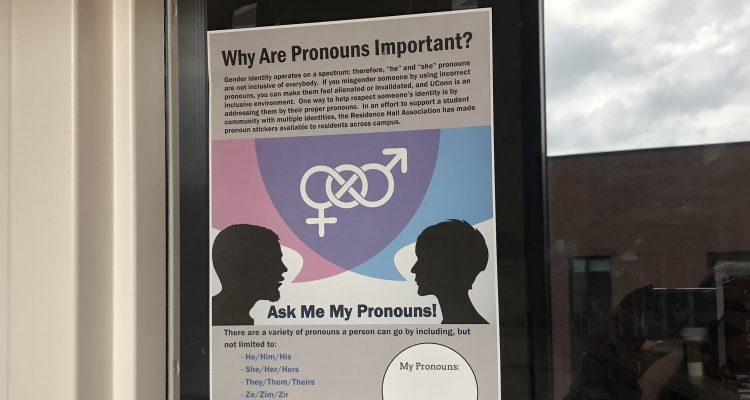By Dharani Rangthale
University of Connecticut’s Rainbow Center has recently put out a series of posters that inform people how to respectfully use gender-neutral pronouns, how to ask someone for their pronouns and how to apologize if someone does not use another person’s correct pronouns.
Rainbow Center Coordinator Julia Anderson said the decision to create the pronouns poster series came from a faculty senate meeting. The diversity committee was looking for a way to get information out to faculty about what gender pronouns are and what people should know. The Center then developed the first poster of the series and then the last two followed as supplements.
“The posters themselves are helpful because they’re a public education experience; people can walk up, interact with them, and learn more information without spending time in a program or a session [. . .] Folks who don’t use [he/she pronouns] sometimes run into difficulties from people who might not know enough about pronouns to appropriately use their pronouns or they might have questions or concerns. Being able to inform people on a larger level can be helpful.”
Anderson said there’s been a strong positive response to these posters from faculty and staff. Many offices on campuses, including ResLife, are looking for printed versions of the posters in order to better inform their residents.
As for those who grew up in a climate where using gender neutral language is not discussed, Anderson emphasized the importance of asking people their pronouns.
Anderson also said the poster that answers, “What if I mess up someone’s pronouns?” is also important to understand, as many people are fearful when they are first interacting with pronouns that they might have not heard of before. Their initial response is almost defensiveness or they give excuses for not being informed when they mess up.
“I think that it’s is important for us to take personal responsibility for our own actions and to be willing to apologize if we mess up but to make a commitment to honor one another’s identities.”
Anderson also said that in order to respectfully ask someone their pronouns, remember to share your own pronouns when asking for someone else’s. Otherwise you know information about them that they don’t know about you.
Anderson said it’s okay to ask for someone’s pronouns, rather than assume and then have to be corrected.
“We’re flawed humans and we live in a society that’s ruled by with a gender binary, so while that’s not an excuse, we have to make a commitment to being willing to apologize and to remedy our behavior.”
“Pronouns don’t fall within a binary, so it’s not all he/she pronouns. Any person can pick any pronoun for any reason. Everyone has a responsibility to know about pronouns, not just people who would theoretically need to explain their pronouns to other people. We all have this responsibility to make this campus a better place and to learn more about one another and to remain informed. The existence of the posters altogether shows that everyone has something they can learn on this subject.”
Anderson said the Rainbow Center still has printed copies of the posters for faculty and staff to pick up for their offices and hopes people will reach out.


